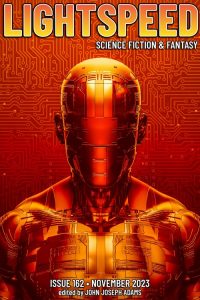Charles Payseur Reviews Short Fiction: Lightspeed, Beneath Ceaseless Skies, GigaNotoSaurus, Flash Fiction Online, and F&SF
 Lightspeed 11/23
Lightspeed 11/23
Beneath Ceaseless Skies 11/2/23, 11/16/23
GigaNotoSaurus 11/23
Flash Fiction Online 11/23
F&SF 11-12/23
The November Lightspeed shows a keen interest in storytelling forms, with stories framed as recipes, as reviews, as confessions, and with Regina Kanyu Wang’s “A Record of Lost Time” (translated by Rebecca F. Kuang) as a series of personal narratives surrounding a new technology called FastForward, which allows users to experience “sped up” relative time. In this state, their productivity skyrockets, and they are able to enjoy vastly increased efficiency… but at a price. Through each iterative story the narrators tell, readers learn that this new way to get ahead actually causes a kind of time radiation that affects more than just the individuals paying the high premiums for the service. Even those who can’t afford or choose not to participate find that the world around people who do use FastForward is bent. And as more and more people find that participation is required to keep up with the demands of employers and more, the entire world begins to experience the side effects of that radiation. Wang sharply sees how new technologies meant to improve human life often are quickly and damningly co-opted by corporate interests into something toxic and increasingly miserable, with ramifications those same corporations never seem to take responsibility for. It’s a complex and grim piece that captures the push and pull between human empathy, creativity, ambition, and greed. Osahon Ize-Iyamu’s “Last Ritual of the Smoke Eaters” also looks at human systems, corruptions, and the consequences of pushing back against exploitation and aggression. In it, Effiong just wants to live with and love their partner, Joshua. When customs and violence tear the couple apart, though, it falls to Effiong to eat the ashes of their dead love, and in doing so perpetuate the practices that lead to his death. And it’s that conflict, the desire of Effiong to buck tradition and find a better, less bloody way forward, that leads to the ashes inside of them coming into conflict with their spirit and their life. Ize-Iyamu does strong work building this world and these customs, in all their unbending and deadly demands, to show what happens when someone cannot abide them and everything threatens to shatter because of it.
November at Beneath Ceaseless Skies opened with an issue themed around the tragedy of relationships that fall against the order of their societies, while showing that love is difficult indeed to banish or extinguish. The second issue, meanwhile, was much more centered on fantastical quests, with characters set seemingly impossible tasks for the promise of equally impossible rewards. In James Morrow’s latest novella “A Dragon in the Abbey”, two siblings find themselves pulled into a quest to compile the necessary materials to create a magical book that could help rid Spain of the dreaded plague. As for Jacob, who converted to Judaism following a revelatory moment with ancient philosophy, he’d rather read a good book than risk his life on some derring-do, but needs must when his sister, Rosalia, a Catholic nun, falls ill. With the help of his sister’s Sisters and Reverend Mother, Jacob seeks to bend religious dogma at least enough to allow for the miraculous and unexplained from a source that might appear other than Christian, all while putting his body (and dignity) on the line to complete the perilous task he’s been set. Morrow keeps things fun and briskly paced while also rewarding some deeper reading concerning names, family, faith, and miracles.
GigaNotoSaurus provides another wonderful read with November’s “Ghosting” by Kelly Lagor, which follows Lydia as she attempts to reboot her life, and not for the first time. Thanks to a neural implant, Lydia can alter her own memories, erasing unpleasant ones in an attempt to reinvent herself every time things get too bad. And with her recurring issues around intimacy and self-sabotage, that happens more often than she’d like… and more often than she remembers. When a mysterious person starts contacting her, though, claiming to be the ghost of someone she’s wronged, it accelerates her self-destructive cycle and leads her into a confrontation with all she’s been avoiding. The story is at turns sensual and chaotic, messy and clever, weaving a mystery around what’s happening to Lydia even as she begins to realize that there are things she can’t just edit out of her brain – there are things she has to face and remember despite how unpleasant, painful, or shameful they might be. Only through that work can she come to terms with who she is, and who she can be. Lagor does brilliant work with Lydia and the cast of characters around her, keeping readers guessing while still eager for the next twist in this rollercoaster of a story.
Nadine Aurora Tabing’s “The Anatomy of a Witchdaughter” provides a memorable opening to November’s Flash Fiction Online, finding Russa faced with having to dissect a mummy that was “liberated” from her homeland by the university she and her parents sacrificed so much for her to be able to excel at. Weighing the cultural damage of cutting apart such an important part of her history against the desire to finally belong to the world that has to this point largely tried to keep her out, Russa hesitates, and the story largely unfolds in that brief window of indecision, doubt, guilt, and hope. Tabing’s story is part academia-based fantasy, part old-school horror, and the result is a rather chilling story that hits well above its word count.
The November/December F&SF opens with a new novella, “The Many Different Kinds of Love” by Geoff Ryman & David Jeffrey, which unfolds on Enceladus 80 years after the AI sent there to both look for life and determine the possibility of mining has lost contact with Earth and all human operators. At least, all of them except for the Sample they have, a kind of aggregate artificial person made up of the memories of all the humans under the government that created it, which is used as the voice of humans in a place humans could not survive. After so long, the AI on Enceladus doesn’t know what to expect, but it’s not the arrival of an AI trying to rebuild connections back to a ruined Earth, and needing Enceladus’s mineral wealth to do so. The piece twists and turns as AI and Sample conflict and cooperate, competing for final say in what is valuable on Enceladus – what can be mined from it or what might already be living there. Ryman and Jeffrey do great work in imagining a human legacy bereft of any actual humans, distilling what it might mean to be human outside any biological definition. It’s a fascinating read. Anya Ow’s “Longevity” shifts focus back to humans while also exploring the differences between those granted a kind of immortality because of their usefulness to businesses and those who live and die at a more “natural” pace. Ruhe is one of the immortals, a claims adjuster who lives simply but for a series of pet cats, the latest of which died the morning the story opens. It leaves her in an emotionally complicated space when she’s assigned the case of a girl whose situation, energy, and anger cut through some of Ruhe’s defenses, and as the two strike up a friendship, Ruhe’s perspective is constantly challenged as she’s pushed to consider short-term as well as long-term goals and realities, having to face how those with all the time in the world to the detriment of those desperate for change. Ow paints a moving picture of friendship, maturity, and humanity.
The issue also features 11 poems, including Geoffrey A. Landis’s “No One Now Remembers –”, which explores what it means to be forgotten. Or, more profoundly than just forgotten, what it means for no one and nothing to remain to say what certain things looked like, smelled like, felt like, tasted like. The scent of a dinosaur. The feel of skin that no longer exists, and hasn’t for a long time. These things are goals that human imaginations have been chasing for a long time, that inspire scientific curiosity and discovery, but which remain out of reach, perhaps forever. It’s a wonderful look at the history of Earth and the larger universe and the walls made of Armageddon that separate humans from firsthand knowledge of the distant past. Finally, Kendrick Brown’s “High Tide at the Olduvai Gorge” imagines a past where a very long time ago some early humans slipped through an intermittent wormhole to a different world, where the harshness of the environment pushed them to develop technology faster. And in the not-so-distant future, those humans return, and they don’t do so peacefully, for all that they claim to be bringing equality to a corrupt Earth. The result is a place where these Elucidans dominate and have rewritten history so that they occupy the top spot in every field. For Ayo, who was a competitive runner faster than any Elucidan, it’s a bitter pill, and Brown interrogates ideas of equality, especially in fields that are inherently competitive. The story finds some hope, still, that even as the goalposts shift to support systemic oppression, there are still ways to push back against that, and strive to win even in a rigged game. It’s very much worth checking out.
Recommended Stories:
“A Record of Lost Time”, Regina Kanyu Wang (Lightspeed 11/23)
“Ghosting”, Kelly Lagor (GigaNotoSaurus 11/23)
“The Many Different Kinds of Love”, Geoff Ryman & David Jeffrey (F&SF 11-12/23)
“Longevity”, Anya Ow (F&SF 11-12/23)
Charles Payseur is an avid reader, writer, and reviewer of speculative fiction. His works have appeared in The Best American Science Fiction and Fantasy, Lightspeed Magazine, and Beneath Ceaseless Skies, among others, and many are included in his debut collection, The Burning Day and Other Strange Stories (Lethe Press 2021). He is the series editor of We’re Here: The Best Queer Speculative Fiction (Neon Hemlock Press) and a multiple-time Hugo and Ignyte Award finalist for his work at Quick Sip Reviews. When not drunkenly discussing Goosebumps, X-Men comic books, and his cats on his Patreon (/quicksipreviews) and Twitter (@ClowderofTwo), he can probably found raising a beer with his husband, Matt, in their home in Eau Claire, Wisconsin.
This review and more like it in the December and January 2023 issue of Locus.
 While you are here, please take a moment to support Locus with a one-time or recurring donation. We rely on reader donations to keep the magazine and site going, and would like to keep the site paywall free, but WE NEED YOUR FINANCIAL SUPPORT to continue quality coverage of the science fiction and fantasy field.
While you are here, please take a moment to support Locus with a one-time or recurring donation. We rely on reader donations to keep the magazine and site going, and would like to keep the site paywall free, but WE NEED YOUR FINANCIAL SUPPORT to continue quality coverage of the science fiction and fantasy field.
©Locus Magazine. Copyrighted material may not be republished without permission of LSFF.







